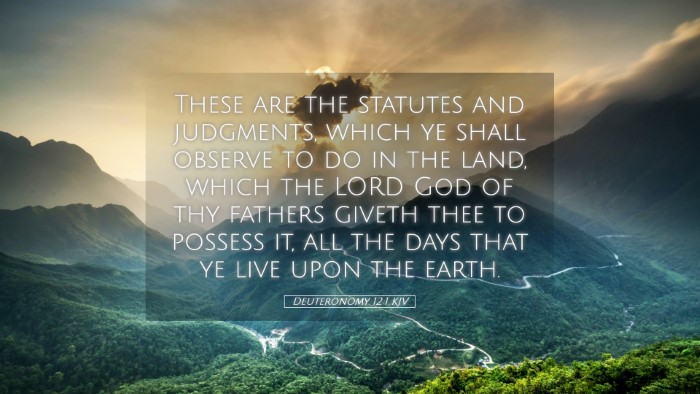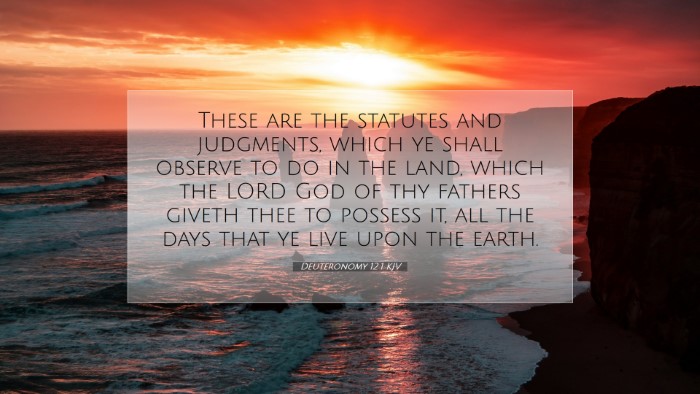Commentary on Deuteronomy 12:1
Verse Reference: Deuteronomy 12:1
This verse stands as an introduction to the laws regarding worship and the centralization of worship in Israel. It establishes foundational principles that govern the relationship between God and His people.
Text of Deuteronomy 12:1
"These are the statutes and judgments, which ye shall observe to do in the land, which the LORD God of thy fathers giveth thee to possess it, all the days that ye live upon the earth."
Contextual Overview
In this section of Deuteronomy, Moses is preparing the Israelites to enter the Promised Land. He emphasizes obedience to God's commands as essential for their success and prosperity in the new land.
Commentary Insights
1. The Nature of the Statutes and Judgments
According to Matthew Henry, the terms "statutes" and "judgments" denote God's sovereign authority and righteousness. The statutes refer to laws that govern societal behavior, while judgments pertain to the consequences of obedience or disobedience. This duality highlights God's comprehensive rule over both the ethical and judicial aspects of community life.
2. The Call for Obedience
Albert Barnes emphasizes that the phrase "ye shall observe to do" suggests a proactive stance in obeying God's commands. It is not passive acknowledgment; rather, it calls for active engagement in fulfilling God's requirements. This point resonates with those in ministry, urging them to cultivate a culture of obedience among their congregations.
3. Reminder of the Promised Land
This verse also recalls God's promise to give the Israelites the land of their fathers, illustrating God's faithfulness. Adam Clarke notes that this acknowledgment reinforces the notion of inheritance, suggesting that their possession of the land is not merely a physical acquisition but also a spiritual one, binding them to covenantal obligations.
4. The Temporal Dimension of Obedience
The phrase “all the days that ye live upon the earth” implies a lifelong commitment to following God's commands. Henry articulates that true worship and obedience are not situational; rather, they are sustained throughout one’s life. Pastors and teachers can draw from this emphasis on lifelong dedication in their preaching and discipleship teachings.
Spiritual and Theological Significance
1. The Centralization of Worship
This verse foreshadows the later establishment of a central place of worship in Jerusalem, signifying the importance of having a unified community of faith. Barnes elaborates that such centralization serves to unify the people under one divine authority, preventing the fragmentation of worship practices.
2. Covenant Relationship with God
The laws provided are an expression of the covenant relationship between God and Israel. Clarke discusses how this covenant is characterized by mutual commitment—God's promises to Israel and Israel’s obligation to obey Him. It is essential for scholars to recognize how this covenantal framework is foundational to understanding the Old Testament and the theological narrative that leads to Christ.
3. Warning Against Idolatry
Implicit within these commands is a warning against idolatry. The focus on observance amidst the land they are about to possess sets the stage for later admonitions against the influences of surrounding nations. The careful observance of these laws is essential to avoid the pitfalls of syncretism.
Practical Applications
- Encouragement for Active Faith: Believers today are reminded that following God’s word requires action and commitment. Pastors can encourage congregants to engage actively with Scripture.
- Community Unity: The call for single-hearted worship and adherence to God's commands fosters unity within the church body. Leaders are encouraged to seek unity in doctrine and practice.
- Lifelong Commitment: The notion of obedience being required "all the days" emphasizes the importance of perseverance in faith, reinforcing the message that the Christian walk is an ongoing journey.
Conclusion
Deuteronomy 12:1 is foundational in understanding the theological and practical implications of the laws given to Israel. It is a reminder of the importance of obedience, the covenant relationship, and the necessity of a central focus in worship. For pastors, students, and theologians, this verse invites deep reflection on how to apply ancient principles in contemporary Christian life.


